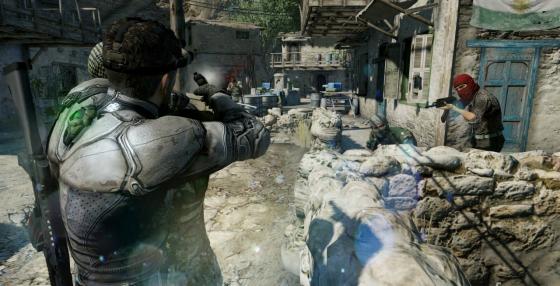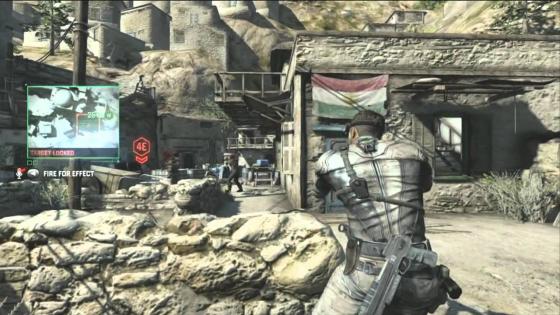Tom Clancy's Splinter Cell: Blacklist Review

Sam Fisher returns in the sixth instalment of Ubisoft's flagship franchise, which does its best in appeasing fans of the original stealthy gameplay and the more recent action orientated fare alike.
From the off Splinter Cell: Blacklist suffers from a bit of an identity crisis; a lot has changed and a lot feels the same. Gone is series stalwart Michael Ironside's rough, gravelly voice and we welcome Eric Johnson's (who?) younger, less world-weary sounds. Also gone is the epicentre of the Splinter Cell ethos – Third Echelon, the NSA subdivision that covertly fights terrorism, has been disbanded due to the corruption uncovered in Conviction, and has now been replaced with the imaginatively titled Fourth Echelon, a covert counter terrorism unit now headed by Sam Fisher himself, answering only to the President, and whose base is ever mobile.
The Paladin is the huge plane from which Fourth Echelon operate, a baseless base if you will, forever in the air and of no fixed home, giving the US President full denyability should the operation ever be discovered. The look, feel and plot is pure Tom Clancy, it is political intrigue cranked up to 11, with a few nods to 24 here and there thrown in for good measure. Music design gets the heart pumping at specific points, whether it be the excitement of the Fourth Echelon guys arguing over what the next mission will be, to Sam hiding in the shadows as heavily armed mercenaries are hunting him down, the musical score tailors itself pretty well to both the plot and the gameplay, rarely allowing for a dull moment.

The story has avoided getting too personal in Sam's life, an element of the previous two games that had bogged down the enjoyment, and concentrated on pure Clancyesque terrorism plots and machinations that keep the series alive, but allowing a few little personable moments as Sam calls his daughter between missions, and comes face-to-face with the man who made him believe his daughter was dead from Conviction.
The feel of the game, right from the first mission, takes a step back from the action-shooter the last instalment Conviction had become, and harks back to the halcyon days of what the franchise was originally all about – stealth. Taking its cues from Chaos Theory and Pandora Tomorrow, Blacklist thankfully has you sticking to the shadows, playing around with gadgets and luring enemies into traps once more. Doubly thankfully, the best elements from Conviction remain intact, such as the Mark and Execute feature and the white silhouette of yourself showing where your last known position to the enemy was. The fusion of old and new gameplay styles could have so easily failed, but Blacklist executes them all perfectly, so to speak.
Naturally, with every new instalment comes a new feature, not just a smorgasbord of old ideas. Blacklist introduces into the mix Killing in Motion, which is essentially the old Mark and Execute feature but while on the run. This means that instead of being limited to just being hidden as you mark your enemies and hit the execute button, popping your head up from behind cover as you effortlessly take up to three terrorists down in beautiful slow motion, you can now do it on foot and out of cover. If you've been caught and are fleeing from gunfire, providing you have excellent analogue stick control, you can mark these people trying to kill you as you leg it past them, and rather than desperately try and fill their bodies with bullets in self defence, you can expertly put bullets between their eyes in a stylish slowmo sequence. This mechanic takes a little getting used to, and is far less useful to your campaign as Mark and Execute, it turns out, but is handy in times of desperation and just looks cool.

To further emphasise the stealth and / or action playstyles, Blacklist introduces a new scoring system, which awards you three separate rounds of points after each completed mission, namely Ghost, Panther and Assault. Ghost points are awarded for silence, non-lethal takedowns and avoidance of detection. Points for a Panther style involve stalking and killing enemies, still with an emphasis on remaining as undetected as possible. However, if you want to be all gung-ho about it then Assault points are awarded for up front deathly combat with whatever noisy firearm you desire. Naturally, being the nature of Splinter Cell, more points are awarded for stealth, but you still get rewarded handsomely for choosing the Assault path. Blacklist is very much tailored for whatever style you're more comfortable with, but realistically if you're going to buy a Splinter Cell game, you're more likely to embrace the hiding-in-the-shadows gameplay and detection-avoiding gadgetry.
Blacklist, however, does more than just update the series, it introduces plenty of features outside of the regular campaign. The campaign mode is standard fare, but involves a very exciting and intriguing plot that integrates well within the core game mechanics. Despite a couple of hiccups along the way, including some arbitrary sniping from a helicopter, the heart of Splinter Cell gaming remains very much intact all the while never seeming to become samey or boring. New features include some side missions which can be undertaken any time but integrate their stories into the campaign fairly seamlessly.
The campaign offers a story mode that feels long and epic but in reality only clocks up to 12 hours of your life, extending that by another 4-8 hours if you attempt to complete all of the side missions offered to you by your fellow Fourth Echelon compadres. It's not the longest game in history, sure, but the experience while you're playing it is well worth the price of admission and at no point should you feel shortchanged. There's plenty of meat on this bone.

Just about everything can be upgraded, too. Weapons, clothes, the Paladin itself, even the lights on Fisher's iconic Trifocal Goggles can be toggled and tweaked with money earned from playing the game. The aforementioned Ghost, Panther and Assault points convert into dollars, as do hacking laptops and picking up dead drops within the campaign. Little incentives and challenges pad out the wallet too, like being awarded ten grand for shooting out five lights with a pistol, or taking out five enemies from above while remaining undetected. Blacklist is littered with little mini achievements like these and add a little more playability to the franchise, particularly for the completionists.
Then there are the multiplayer aspects, all of which are things of beauty. Within the campaign there are side missions which can be undertaken solo or with a partner, and it is here that Blacklist opens up and blooms beyond its tried and tested solo missions. Take on waves of enemies in ever-increasing numbers and difficulty or storm buildings together and take out high value targets in tandem, playing with another player cooperatively has you thinking in tactics so advanced it's like you were trained by Fourth Echelon themselves. Coaxing a sniffer dog away from your partner as he stealths on by, or a perfectly timed assault on multiple enemies from opposite directions, playing Blacklist cooperatively expands on previous instalments' attempts and makes them infinitely more satisfying to play through than Army of Two. It really pays to play with a friend, or at least a random with a headset who's willing to communicate with you, as planning precision-timed attacks or tactical plans is pretty necessary in co-op missions, and it looks just plain silly to play Splinter Cell together but apart, doing your own thing.
Then you have a more refined version of Spies Vs Mercs, the original take on team multiplayer first seen way back when in Pandora Tomorrow, and pits up to 4 spies working together to hack computers against up to 4 heavily-armed mercenaries who must stop their computers being hacked. The beauty of this game mode is the sheer difference in gaming experience depending on which side you're on. Being a spy is naturally more familiar territory, sneaking about hiding and climbing on everything possible, armed to the teeth with gadgets to keep you and your team from being detected. The mercs, on the other hand, are played instead from a first-person perspective, with emphasis on hunting these pesky spies and gunning them down with your heavy weaponry. Two distinctly different gaming genres and modes of play mash together to create a truly unique game mode.

Sure enough, after a few plays through each map, Spies Vs Mercs gets a little familiar, with mercs systematically checking the likely hiding places they can memorise from previous plays, and spies taking cover in the same hiding places which serve them best, but all in all the maps are well designed and the gameplay is original, a breath of fresh air into the multiplayer side of stealth gaming.
Splinter Cell: Blacklist is a beautiful game. The console version even comes on 2 discs, with the second disc acting as a graphics enhancer of sorts. Install it to your hard drive, and textures, clothes, water effects... everything looks incredible, which must have been a labour of love for the guys at Ubisoft who are designing a game where it's better to remain in the dark and concealed as possible. No stone has been left unturned with Blacklist to bring you a fully immersive, exciting and luscious-looking product.
Blacklist steers the Splinter Cell franchise into newer waters while remaining true to itself. Sure, many of the features present in the first Splinter Cell outing have long been forgotten, but purists who may have thought the franchise had lost its way a little with Double Agent and Conviction can rest assured that Blacklist has purposefully hand-picked the finest pieces of each of the games and woven them all together in, hands down, the finest outing Sam Fisher has had to date. A bold statement, but one I stand by.
Tom Clancy’s Splinter Cell Blacklist (Reviewed on Xbox 360)
Excellent. Look out for this one.
Sam Fisher returns in the sixth instalment of Ubisoft's flagship franchise, which does its best in appeasing fans of the original stealthy gameplay and the more recent action orientated fare alike.










COMMENTS